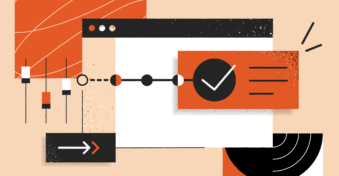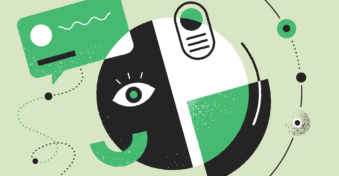Businesses are always looking for ways to improve their processes and increase profitability. To do this efficiently, companies can utilize various software solutions, such as ERP and CRM, to streamline processes and simplify accessing important data.
While CRM and ERP often work together, business owners need to realize the differences between these types of software. Understanding the difference between CRM vs. ERP is essential when deciding which software you need or whether you require both solutions.
What Is a CRM?
You might be wondering what CRM is. CRM, or customer relationship management software, is a tool that manages the different ways that customers interact with your business. As such, this tool will contain a database of all current and potential clients, along with information on where they’re in the sales process and their history with your business.
CRM is useful for sales teams as well as support departments. Sales teams can manage the sales pipeline using CRM and ensure they guide prospective clients through the sales funnel in an organized and efficient manner. Support teams can use CRM to check on a client’s history when they report any issues. This enables the support team to handle any situation most effectively.
Key CRM Features
Let’s take a look at some of the key features that CRM software includes.
Contact Database
Any good CRM tool will include a contact database where all important information regarding existing and prospective clients can be stored. This information isn’t only useful when a client contacts the business but can also be used in marketing.
Salesforce Automation
The sales process is full of routines that are simple and repetitive, yet doing them manually takes a fair amount of time away from your sales team. This can include automating follow-up emails, appointment confirmation letters, distributing sales leads, and scheduling meetings, amongst other tasks.
Contact Center
The contact center feature is useful for ensuring that clients with questions or concerns get the help and service they need. This feature makes it possible for your support team to view the history of the client, see what products or services they purchased and help them address any of their issues.

Marketing Automation
This feature is another time-saving process. There are many different avenues of marketing, and many of them are repetitive. You can use this tool to automatically send surveys after a client has made a purchase or requested support. You can also use it to automatically send follow-up emails and promotions to clients who’ve already made purchases.
Customer Self-Service
Having customer self-service features available will free up time with your support team so that they can address more serious or complex issues. Self-service also enables businesses to offer 24/7 support without needing a round-the-clock support team.
Benefits of CRM
The benefits of using CRM software for business include:
- Better customer service
- Increased sales
- Improved customer retention
- Detailed customer analytics
- Increased productivity and efficiency
- Centralized database of consumer information
- Improved lead nurturing and communication
- Better customer segmentation
- Automated sales reports
- More accurate sales forecasts
- Streamlined internal communications
What Is an ERP?
Now that we know what CRM is, you might be thinking about ERP and where this software factors in. What is ERP? Enterprise Resource Planning (ERP) software evolved from material requirements planning as a way to efficiently manage all the resources required by a business to operate successfully. At its core, ERP software has a focus on finances such as general ledgers (GL), accounts payable or receivable, payroll, and other forms of financial reporting.
However, this isn’t all that ERP does. The software is also beneficial for improving inventory management, order management, supply chain management, and other data-related services. Good ERP tools will also touch on procurement, production, and distribution, with the best tools also offering Human Resource Management Systems, CRM, and e-commerce.
Key ERP Features
Let’s take a look at some of the key features that ERP systems provide.
Financial Management/Accounting
ERP systems will provide you with numerous financial management features, such as maintaining a general ledger, monitoring accounts payable, tracking profit, and other valuable financial data.
Order Management
Order management features cover everything within the order process. This includes order entry, delivery date, status tracking, and even credit limit checking. This improves order fulfillment while also benefiting the customer relationship.
Production Management
This is an ideal feature for companies that make their products. It enables various departments to track, manage, organize, and monitor the production of their goods.

Supply Chain Management
Managing your supply chain is essential to mitigate any risks or delays when producing or procuring products or services. Supply chain management provides businesses with an overview of their supply chain so that they can see how operations work, where potential issues may be, and organize effective measures to mitigate these risks.
Inventory/Warehouse Management
Warehouse and inventory management is very useful as it allows businesses an overview of the amount of stock they have on hand. This is essential for monitoring stock levels, managing the procurement of new stock, managing the supply chain, and even impacts on delivery.

Procurement
Procurement features are a great way to evaluate potential vendors when deciding who your business wants to work with. You can rate vendors on their prices, quality, delivery time, and other important factors to help you identify the best candidates to work with.
Benefits of ERP
The benefits of using ERP systems include:
- Improved productivity
- Complete financial transparency
- Effective financial planning and budgeting
- Real-time financial monitoring
- Minimizing human error
- Ability to track invoices and documents
- Centralization of financial information
- Streamlined procurement and production management
What Is the Difference Between CRM and ERP?
When it comes to deciding between ERP vs. CRM it’s important to understand the difference between them. It’s only by understanding what makes these systems different that you’ll be able to identify which one your business needs.
The biggest difference between ERP and CRM software is their focus. CRM tools are focused on the customer experience. Therefore, it includes features related to improving the efficiency of the customer experience. CRM systems are ideal for businesses that deal with a lot of customers and need a way to efficiently nurture these leads as they progress through the sales funnel. It’s also essential for businesses that want to improve their customer services and provide a great experience for new and existing consumers.
Alternatively, ERP software places a bigger focus on the business’s finances and what’s required for the business to operate. An ERP system is an ideal solution for businesses with a small group of high-profile clients but complex financials.
This major difference between an ERP and a CRM means that they can’t be compared to each other as they both serve different purposes. If you were to use these tools simultaneously, your business could benefit from the combined features of these systems.
ERP and CRM Integration
The best option is for businesses to use both of these systems as it’ll provide a great overview of multiple business processes. However, this isn’t always immediately possible. As such, it’s not uncommon for a business to start with one system and add another later on. Most CRM tools offer integration options for ERP; however, this can sometimes be expensive.
The most affordable way to ensure seamless integration between your CRM and ERP systems is to use ERP software with CRM capabilities as an add-on feature. Not only will this unify both systems, but the information will be updated in real time, which makes it more accurate and efficient.
However, in some cases, customer relationship management is more important at the beginning. If this is the case for your business, make sure to choose a tool that offers multiple ERP system integrations that you can consider in the future.
Final Thoughts
Businesses are constantly on the lookout for systems and software to improve their processes. If you’re trying to decide between ERP or CRM, it’s important to understand what makes these tools different from each other. While CRM focuses on the customer experience, ERP focuses on the finances of your business.
Both of these are essential for businesses to grow and succeed, which is why they’re best used together. However, if you’re not in a position to implement both systems simultaneously, choose the one that addresses most of your requirements and ensure that it has integration options for the future.
Alternatively, you can opt for a simple and free CRM solution like the Inbox CRM from PandaDoc browser extension and pay for an ERP system to get you started on improving both processes.
FAQs
-
When it comes to deciding between ERP and CRM it’s important to remember that both tools have benefits for your business and can help improve various processes. Deciding which one will depend on whether your business has a lot of clients and needs a way to improve their experience, or if your business has complex financials that need to be considered.
-
An ERP isn’t the same as a CRM system as both tools have different focuses. While some businesses don’t need CRM programs, they could be very beneficial in helping to improve the customer experience which will increase sales. You can look for an ERP system that includes a CRM.
-
Businesses in the manufacturing industry will benefit greatly from ERP systems. Alternatively, CRM systems are wonderful tools for companies in the software, technology, and sales industries among others. However, any business can benefit by using both systems simultaneously.


